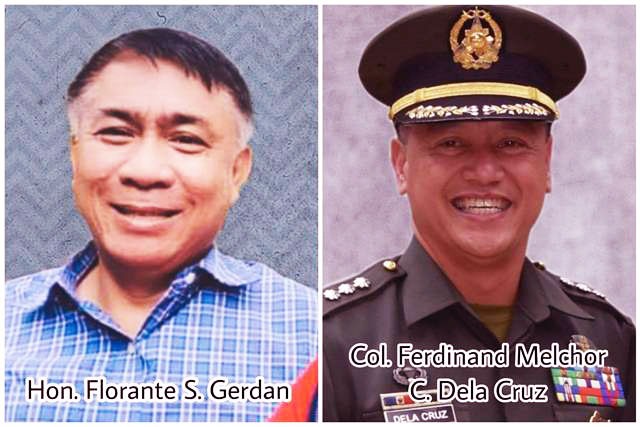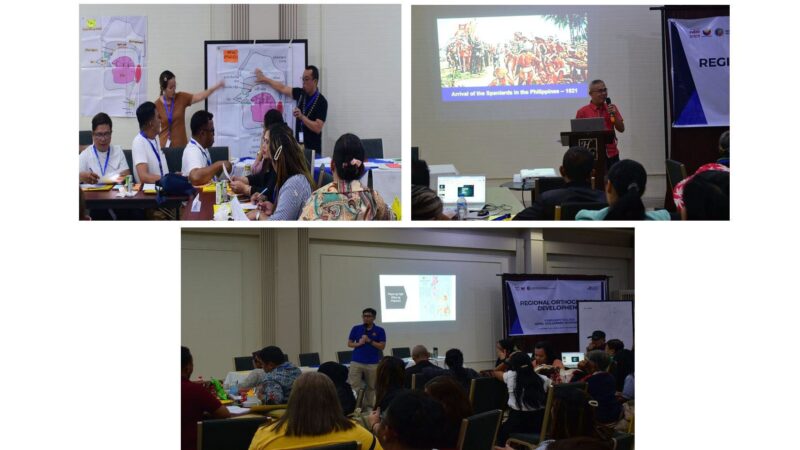Change for the Chance: ROTC 2022

When BM Gerdan was the Commandant of Nueva Vizcaya State Polytechnic College-ROTC Unit, (now Nueva Vizcaya State University-Annex), the unit got the Best ROTC Educa’l Institution of the AFP ROTC Unit in the entire country in 2003 and back-to-back Champion in the Reg’l Annual Administrative Performance Evaluation in 2002 and 2003; Col. Dela Cruz was a Cadet Officer of the Univ. of Sto. Tomas- ROTC Unit before going to the PMA. He introduced a multi-role cadet organization to make the ROTC program appealing and more relevant not only to students but to the schools and universities that administer the ROTC as well. He is a recipient of two Gold Cross Medals. Photo by: Mae Barangan
Late Realization
I felt lucky when I entered college and the Reserved Officers’ Training Corps (ROTC) is no longer mandatory. As a young woman that I was, I focused more on doing things that emphasize my being feminine. So, I never wanted to endure the sun’s heat during formation nor face a challenge for the military training done in ROTC class. National Service Training Program (NSTP) was my option. Light and easy, I need not have to exert extra effort to pass it but I gained lesser training that could have inculcated the importance of patriotism.
Now earning bread and butter through my career being a publisher, understanding how national security would affect my everyday life came this late.
The Pronouncement
When His Excellency President Ferdinand “Bongbong” Marcos, Jr. declared the mandatory ROTC program for Grades 11 and 12 during his first State of the Nation Address, it prompted several people and organizations to express their insights. The UP Vanguard Incorporated, an alumni association of graduates of UP ROTC advanced courses, has agreed to the return of mandatory ROTC. To avoid abusive practices, the group proposed forming a commission to focus on citizen service training rather than putting it under the jurisdiction of the Armed Forces of the Philippines (AFP). Furthermore, National Youth Commission chairman Roland Cardema stated that ROTC will aid in the teaching of discipline and nationalism to young people. Contrary to these statements, Raoul Manuel of the Kabataan Partylist expressed his displeasure regarding the matter due to the past issues that were not resolved up to this date.
Looking back, mandatory ROTC was abolished in 2002 due to hazing, inefficiency, and corruption following the passage of Republic Act No. 9163, otherwise known as the “National Service Training Program (NSTP) Act of 2001 which aimed at enhancing civic consciousness and defense preparedness to students.
From their Point of View
Since the mandatory ROTC was scrapped, there had been a fall in the turn-out of enrollees. Col. Ferdinand Melchor C Dela Cruz, Philippine Military Academy graduate-Class ‘92, former ROTC Commandant of the University of Sto. Tomas, former Commander of the K9 “War Dogs” Battalion and the present Chief of Staff of the 5th Infantry Division of the Philippine Army identified the three main problems that contribute to this effect:
- Implementation problem. Reserve Commands, particularly the Regional Community Defense Groups, which have control over ROTC units in schools nationwide, have the lesser organic personnel to carry out the program. This is most likely due to Army headquarters believing that there are more priority units to be filled in, giving Infantry units a lot of weight in terms of force placement.
- Image problem. The nature of military training has also created a false impression among students, who are led to believe that the practice of inflicting physical punishment on subordinates, as well as “rituals” introduced to the military by fraternities as an “organizational tradition” of transforming boys into men, are part of military training. The tragic cases of deaths and reported hazing rituals deter students and their parents from participating in military training, and; the presence of an easier option for the NSTP curriculum. Also, along with tuition increases and other social issues, leftist organizations that infiltrate schools to advance their own agendas find the “Militarization Issue” to be the most convenient agitator. In light of previous hazing and corruption cases, student activists believe that such issues are valid and marketable to young and idealistic minds.
- Easier NSTP option. In some schools, students are encouraged to join Civic Welfare and Training Service because the program is overseen by school professors, unlike in the ROTC where officials must come from outside the school organization. The other two programs are also lighter than ROTC, which most students would prefer to take because most of them go to college to finish a course, not to train as a potential military recruit or reserve.
Dela Cruz concludes that the noble purpose of the ROTC program, as well as the reason for its existence, far outweigh the reasons for its downgrading or proposed removal as a curriculum in the Philippine education system. Citizens who are nationalistic and patriotic are essential for a strong and progressive nation. ROTC is the only college curriculum that teaches our youth such values. Its military training may prepare students for more than just becoming reserves or potential Armed Forces personnel. It also produces good business leaders.
On the other hand, Board Member Florante S Gerdan of the Province of Nueva Vizcaya who experienced ROTC at Technological Institute of the Philippines while taking up Civil Engineering, a graduate of Royal Military College in Duntroon, Canberra, Australia, resigned from commission with a Captain rank, Former President/Chief Executive Officer of Poro Point Management Corporation, president of the Philippine Confederation of ROTC Association, Inc. (PCRAI) and administrator of “ROTC Ako Galing” FB page strongly recommends that Government assistance should be provided in the form of operational and administrative funds, as well as infrastructure development funds to build training areas, cadet officers’ quarters, and so on. Cadet officers should be billeted in a specific area near or on their school campus so that they can be trained in the regimental way of life desired of military personnel. Sunday activities should be moved to Saturday to allow all cadets to practice their respective religious beliefs.
Gerdan worked overtime for his advocacy to bring back the mandatory ROTC. From 2014 to 2015, their organization continuously convened to rule out the inertia that freezes their position to change the system. Their labor called them to come up with an initiative to petition congress to amend the NSTP Law. The proposal was initially presented to Congressman Gary C. Alejo and Sen. Antonio V Trillanes IV but it did not pursue a hearing due to time constraints and preparations for the 2016 national and local elections.
The delay led them to the decision to push the ROTC Law rather than amending the NSTP Law. The proposed amendment includes the ROTC training program to be called Reserve Officers Training Program which will feature HADRRTS and MTS as its component. Graduates of HADRRTS will be assigned to the office of the Civil Defense to form part of its responders during disaster situations and shall be called OCD Reserve Corps. The graduates of MTS will be assigned to the Armed Forces of the Philippines to form part of its responders during military emergency situations and shall be called AFP Reservists. A cross-training shall also include anti-illegal drug subjects and civil welfare subjects among other nation-building topics.
Consider to change
It’s been said that the ROTC’s reputation was besmirched with controversies. Nonetheless, President Marcos cited it as one of his administration’s top priorities.
The earlier mentioned resource persons whose lives were greatly influenced by the courses thought in the ROTC, now take the position to keep open the possibility of improvement within the corps. Their credibility and their call for changes are equally important; the democratic polity should take a nod on the negotiating table. The identification of the problems and proposals for amendments sheds light on the dimmed corps’ core purpose when it was taken merely as an option in the curriculum. The people and the state should walk abreast in educating the young minds that the importance of national security is a matter of concern, not a choice taken with leisure. ROTC after all is a breeding ground for future sentinels. Hence changes for the chance to call it mandatory again is an obligatory act for the government.
The school year will be opening soon. As the incoming Senior High students anticipate for the full implementation, the statement of Prospero De Vera III of Commission of Education that the Commission is ready to submit its proposals for revisions to the ROTC and National Training Service Program (NSTP) to the President and Congress comes with hope and assurance that changes will transform the corps. To quote, “It is now up to the ROTC leadership to make the program appealing and relevant, not only to students but the whole society as well,” (by Col. Ferdinand Melchor C Dela Cruz). Such strong stand will create demonstrations and rallies purposely to grow pressure to halt its implementation. But these social movements should not trammel the President to his purpose to keep it mandatory.
Should the incoming Senior High students be required to attend lectures on military science and participate in war-like bivouacs, this is not to punish them but to mold and give them the right to be called as the country’s future defenders. # Mae Barangan //FNS







